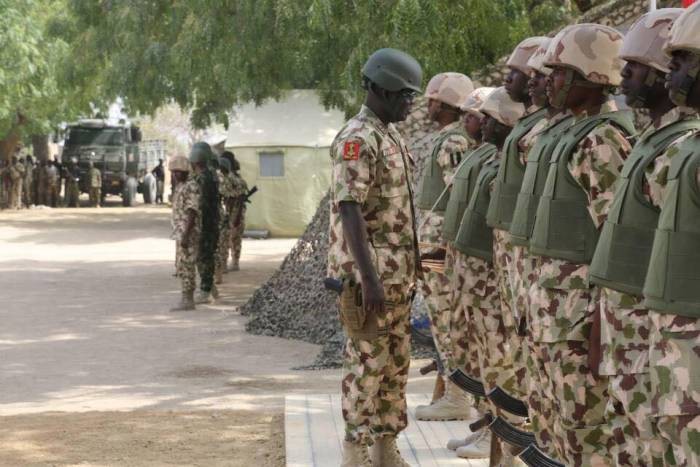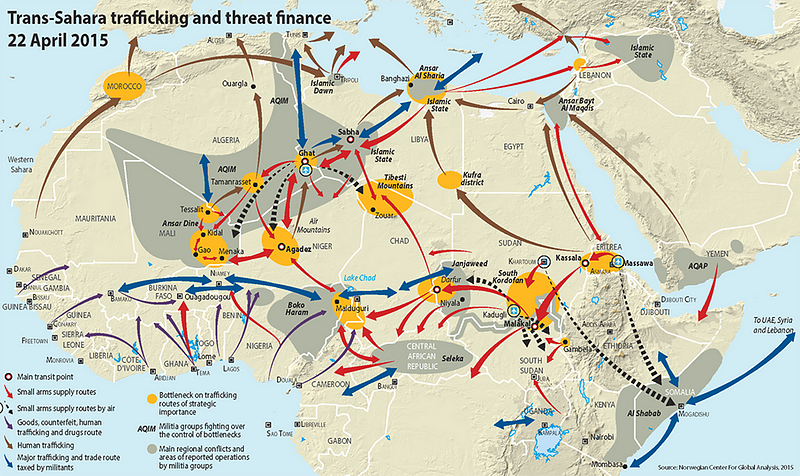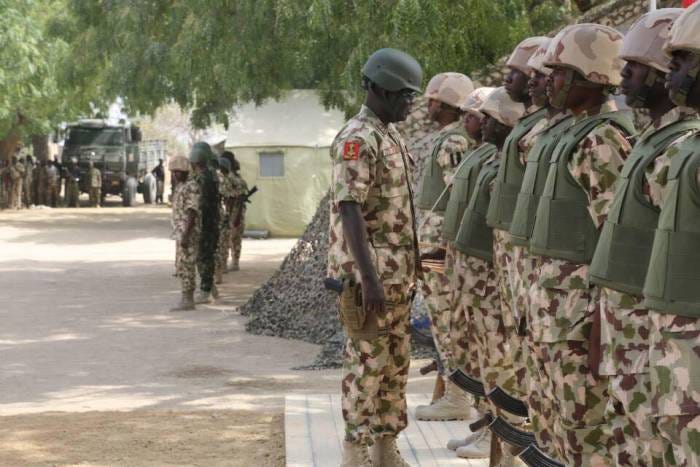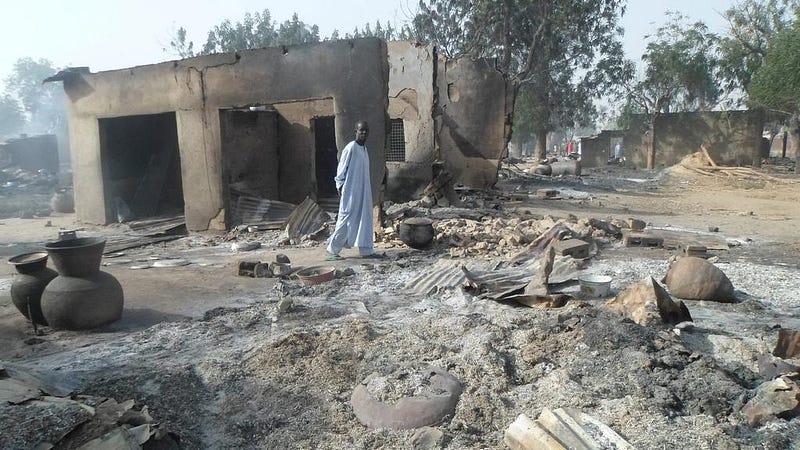
Lake Chad: A Nexus of Violence
Last week’s article discussed the humanitarian crisis at Lake Chad where food insecurity and widespread poverty continue to afflict the local population. This crisis, born out of resource scarcity and inadequate government support, has allowed for violent extremist groups and transnational criminal organizations to expand and operate. Porous borders, ungoverned spaces, lack of security, and local conflicts create opportunities for armed groups to recruit members and expand their power.
The following image from the Africa Center for Strategic Studies shows the vast network of trade that flows through the conflict regions of Africa. Large expanses of ungoverned territory provide a virtual highway for transnational criminal organizations. Illicit trade is a “high reward, low risk way to make a profit” (ACSS). These trade routes, which have existed for centuries, are being used to traffic arms, drugs, humans, contraband, natural resources, and cultural property, with Lake Chad as a central hub for materials moving across the Sahel, Sahara Desert, and to nearby Boko Haram territory.

Illicit trafficking also appeals to violent extremist groups who are looking to generate a reliable stream of income to fund their operations while continuing to supply themselves with weapons and other necessities. When transnational criminal organizations and violent extremist groups begin to work together, they increase their power — becoming more well-funded, better armed, pervasive, and destablizing.
Many impoverished and underdeveloped communities are susceptible to the lure of transnational crime. When the staple livelihood practices depend on increasingly scarce natural resources, unemployment is high. People will resort to anything to provide for themselves and their families. Trafficking and smuggling has proven to be a lucrative business employing many people across the continent.
As discussed last week, similar can be said for violent extremist groups. Populations without access to basic services who are struggling to survive, like many of the people living in rural Lake Chad, can be receptive to organizations that offer a measure of stability in their lives. For example, while Boko Haram originated in northeastern Nigeria, it has used a combination of financial incentives and intimidation to recruit desperate and vulnerable communities and to spread its influence throughout the entire Lake Chad Basin area. See Boko Haram Primer for a comprehensive report on the organization.

National coalitions have have had some limited success in their efforts to mitigate the influence of extremist groups. The Lake Chad Basin Commission (LCBC), founded in 1964, was started in an effort to oversee shared use of Lake Chad’s natural resources. It is currently comprised of the following member countries: Chad, Niger, Nigeria, Cameroon, Central African Republic, Algeria, Libya and Sudan.
The Multinational Joint Task Force (MNJTF), made up of troops from Nigeria, Chad, Niger, Cameroon and Benin, is an initiative of the LCBC. The current responsibilities of the MNJTF include counterterrorism operations and stabilization of the region. While the task force is a concrete step towards cooperation between affected countries and combating terrorism, there is a lot of skepticism surrounding the effectiveness of the MNJTF. The countries surrounding Lake Chad have a history of mistrust and competition which has made it hard for the task force to operate across borders. The language barriers that exist between soldiers, civilians and the people they are fighting also complicate the situation.
Despite some of these setbacks, the MNJTF has been able to take back important territory from Boko Haram. Unfortunately, these military successes were not capitalized on with development efforts The LCBC members, in an effort to reduce the strain that Internally Displaced Persons (IDPs) are placing on their resources, have urged all IDPs to return to their homes in these newly cleared areas. The returning population is now faced with the daunting task of rebuilding communities under the same conditions that led to the initial instability. Lack of effective governance combined with environmental and financial pressures all point to a future of conflict vice peace in the region.
Though Boko Haram has been forced out of much of the territories it once controlled, the group has shown that it is still able to carry out attacks and frequently targets civilians. At the same time, other violent extremist groups, some linked to Al-Qaeda and ISIS, continue to expand and operate in the Sahel.

The unstable conditions that exist in the Lake Chad Basin leave the region incredibly vulnerable to groups associated with crime and extremism. The violence and insecurity that these groups bring only adds to the instability that stems from an already existing environmental and humanitarian crisis. Without addressing these underlying issues through effective governance, the threat of violence will continue to undermine progress in the Lake Chad Basin and surrounding areas.
Next week’s article that will discuss U.S. involvement in the region.



